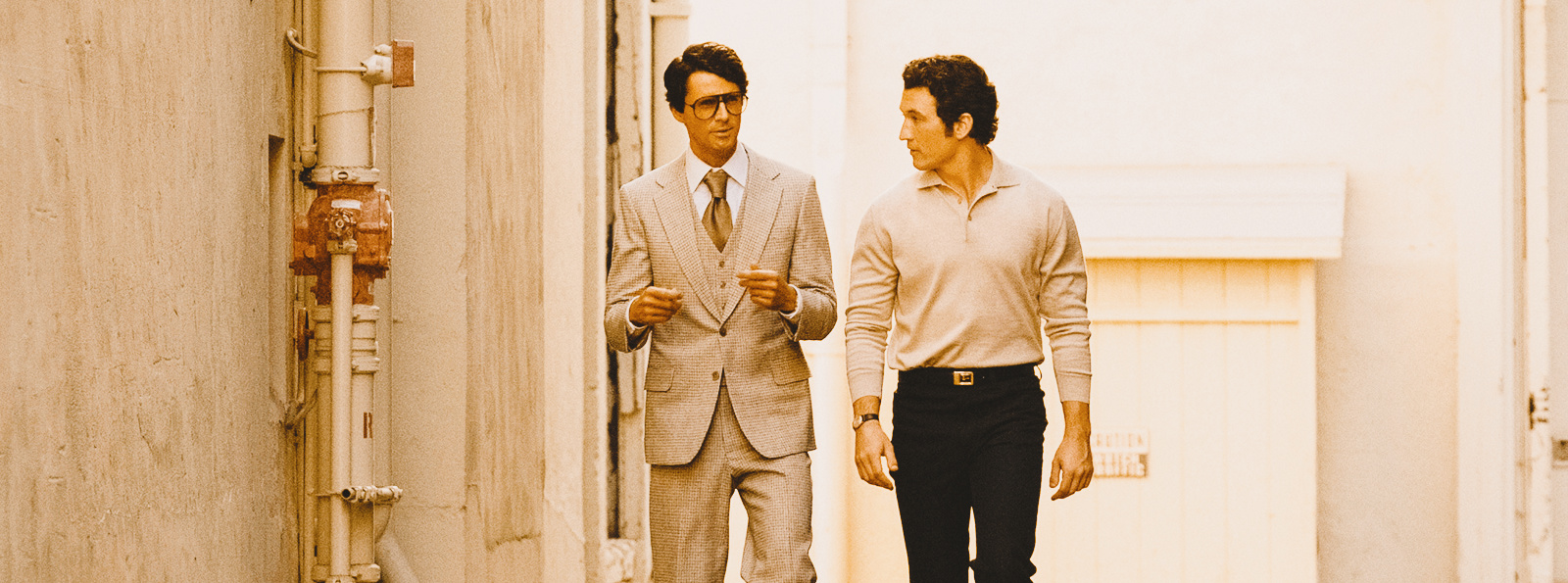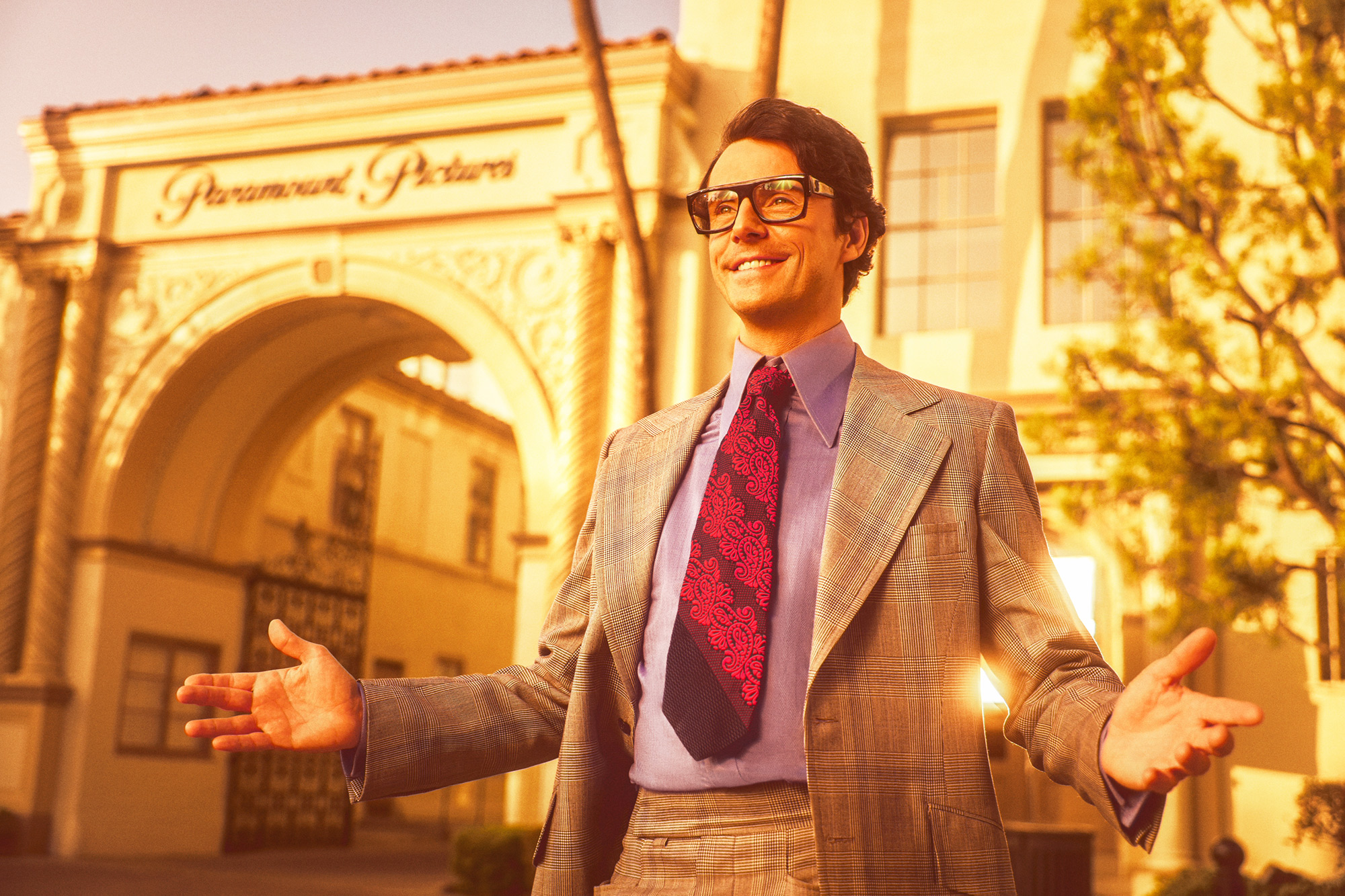
The Godfather is one of the most revered films in history, remarked upon repeatedly at screenings and panels, in retrospective essays, and interviews. When The New York Times spoke with Al Pacino recently about his work in the film as Michael Corleone, he stopped himself, remarking that he was telling old stories. Naturally, this prompted writer Dave Itzkoff to urge him to continue. “That’s OK. It’s why we’re here.”
It’s been 50 years, and fans of the film seem to never tire of its behind-the-scenes odyssey and how director and co-writer Francis Ford Coppola went to war to get his cast and preserve the sanctity of his vision. But is there enough appetite to justify The Offer, a 10-episode (premiering April 28 on Paramount+) exploration of that origin story, particularly among people who aren’t deeply passionate about The Godfather and who are just looking for a good TV show?
The Offer checks a few of the superficial boxes one would expect from a peak TV potential. It looks fantastic with an obvious effort to feel of its era without overdoing it. There’s obvious attention to detail to make sure that certain settings, instantly recognizable to Godfather fans, also pop. The creative team brings appropriate gravitas with Dexter Fletcher (who has been involved with a number of high-profile biopics) and Michael Tolkin (who wrote The Player, among many other things). And the cast is stacked with familiar faces playing familiar names. But throughout, The Offer never lets you forget that this is, first and foremost, a celebration, which limits its appeal and audience.
The irrepressible love for movies comes up a lot here as a unifying concept. Believers are lifted up by it, doubters might just become converts. They aren’t making a movie, they’re making magic. It can be a little hard to stomach at points, even though you and I surely have a touch of it within ourselves. Still, that and the overabundant reverence for The Godfather before it’s actually THE GODFATHER can take you out of the show, at times. This happens, specifically, when moments in The Offer are intentionally meant to echo something from the film, poking you in the ribs like the sharp elbow of an over-enthused friend who wants to make sure you make a connection that is unmissable. Real or not, it may have been better to get a little more distance from what we know to be the end result and a group of scrappy artists reaching in the dark to eventually get to that. The talent was certainly there on the screen to bring something more compelling and less fan service-y to life.
As the singularly focused producer of The Godfather upon whom most of the narrative hangs, Miles Teller plays Al Ruddy as a man with a hustler’s spirit, a diplomat’s brain, and a physical presence that makes you think he could take or throw a punch. There is an underlying charm and smoothness to his performance as he plays bosses against each other while simultaneously managing an intense (and kind of whiny) Coppola and the mob. Teller, of course, replaced the scandal plagued Armie Hammer at the start of the production.

As Ruddy’s initial champion, Robert Evans is hugely important to this story and an icon in his own right, albeit a deeply flawed one. The voice, big glasses, and even bigger ego might overtake a lesser performer, but Matthew Goode harnesses these things to create a portrait of a man who believed and embodied with every fiber of his being the fantasy of Hollywood in that era, living large while smartly picking winning horses like Love Story, Chinatown, and The Godfather while running Paramount. This before a down period precipitated, in part, by vice. The on-ramp to that part of Evans’ life is explored here and it is the most compelling part of the show.
Rounding out the primary cast is Giovanni Ribisi as mob fixer Joe Columbo, who chews scenery while getting uncomfortably close to Ruddy at the outset of the production. Juno Temple plays Ruddy’s assistant Betty McCart, a woman of high ambition pushing back against the boy’s club of Hollywood while making herself an indispensable cog in the production and bridge between her boss and the head of Paramount’s parent company, Charles Bluhdorn, who is played by Burn Gorman. As Bluhhorn’s lieutenant, the usually likable Colin Hanks gets saddled with the thankless task of playing Barry Lapidus, a mostly 2D penny-pinching suit. Unlike Bludhorn, McCart, and most everyone else here, Lapidus is fictional and it isn’t hard to tell. In contrast to Bludhorn, his arc is frustratingly underdeveloped and the need for the character is questionable.
Dan Fogler nails the irrationality of a spoiled artist as Coppola, near-literally holding his breath until he gets every single thing he wants, flying off into a near panic when it seems as though he may have to make even a minor sacrifice. He’s also spectacular when playing with Patrick Gallo (who plays Mario Puzzo, the writer of The Godfather novel) as they strike up a fun bromance working on the script. But was that real, was Betty as instrumental, was Evans’ ultimately positive impact overstated, what about Ruddy and Columbo and death threats?
As we’re seeing with HBO’s Showtime era Lakers dramatization, Winning Time, there are chaffed principals making their dissatisfaction known. This Deadline article by Peter Bart, a legendary Hollywood media figure who served as Evans’ right hand during this era (and who was instrumental in optioning Puzzo’s novel and hiring Coppola), undercuts some of the mob themes that propel the danger at the heart of this, calling upon the testimony of others who were there.
In the end, the real or not debate is an interesting one. Since time immemorial storytellers have lifted historical figures and moved them around the sandbox like action figures, rewriting history to suit the narratives they’re trying to tell. The morality of that is subjective. Does it impact how good or compelling a show or movie is? That might be the more pressing question worthy of deeper exploration. But if The Offer is an exaggerated tale born from aggressive dramatic license, then the producers might have been better served taking a few more liberties to be more consistently entertaining and justify the investment of 9-10 hours to get through this. Otherwise, maybe this would have been better off as a standalone movie. Still, it did make me want to watch The Godfather again, seeing it through eyes imbued with a refreshed appreciation for all that went into making this improbable and masterful thing (even if parts were maybe a little exaggerated). And after having seen this movie 20 or 30 times and hearing some of these stories over and over again, that’s quite the accomplishment.
‘The Offer’ premieres April 28 on Paramount+ with the release of its first 3 episodes. More will follow weekly.
